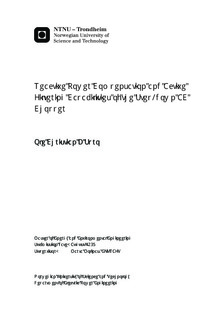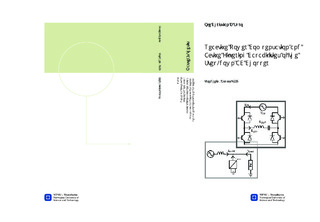| dc.contributor.advisor | Molinas, Marta | nb_NO |
| dc.contributor.author | Spro, Ole Christian B | nb_NO |
| dc.date.accessioned | 2014-12-19T13:54:41Z | |
| dc.date.available | 2014-12-19T13:54:41Z | |
| dc.date.created | 2013-12-11 | nb_NO |
| dc.date.issued | 2013 | nb_NO |
| dc.identifier | 678346 | nb_NO |
| dc.identifier | ntnudaim:10155 | nb_NO |
| dc.identifier.uri | http://hdl.handle.net/11250/257711 | |
| dc.description.abstract | The Step-down AC Chopper (hereby referenced as "AC Chopper") has been presented in recent academic papers as a possible solution for reactive compensation. The goal of this project was to investigate and evaluate the topology to see if the praise could be justified. In addition, this project set a goal to take the research one step further by investigating if the uses of the AC Chopper could be expanded to include active filtering. The ability of the AC Chopper converter to produce harmonic current was investigated. This was the first step in developing the AC Chopper's active filtering functionality. Theorems were developed and simulations were performed with both open and closed loop control. The results show that using the AC Chopper to produce harmonic current is very difficult if not impossible. This is due to intrinsic characteristics of the topology which leads to the converter producing multiple harmonics for a single control input frequency. Hence it was concluded that the AC Chopper is not fit for performing active filtering and that the results do not support continuing any further research on the AC Chopper's filtering capabilities.A prototype of the converter was developed and built to compare the simulations against real observed behavior. The development process has been well documented in this thesis. Open loop control of the prototype was successfully implemented. The results show a good relation between the theory and the measured values. There are certain challenges connected to the realization of the AC Chopper, and the ways of dealing with these challenges have been described herein. The topology was also compared to available technology to evaluate the competitiveness regarding reactive compensation at fundamental frequency. The AC Chopper was not found advantageous compared to the VSI, a modern available solution. The efficiency of the AC Chopper has been found to be slightly higher in simulation, but this has yet to be validated with tests on real prototypes. In addition to lacking the filtering capabilities, the AC Chopper has other disadvantages including expensive components and greater volume. Together the findings in this report suggests that the AC Chopper should be limited to use in single phase systems for reactive compensation at fundamental frequency in open loop control. | nb_NO |
| dc.language | eng | nb_NO |
| dc.publisher | Institutt for elkraftteknikk | nb_NO |
| dc.title | Reactive Power Compensation and Active Filtering Capabilities of the Step-down AC Chopper | nb_NO |
| dc.type | Master thesis | nb_NO |
| dc.source.pagenumber | 139 | nb_NO |
| dc.contributor.department | Norges teknisk-naturvitenskapelige universitet, Fakultet for informasjonsteknologi, matematikk og elektroteknikk, Institutt for elkraftteknikk | nb_NO |

